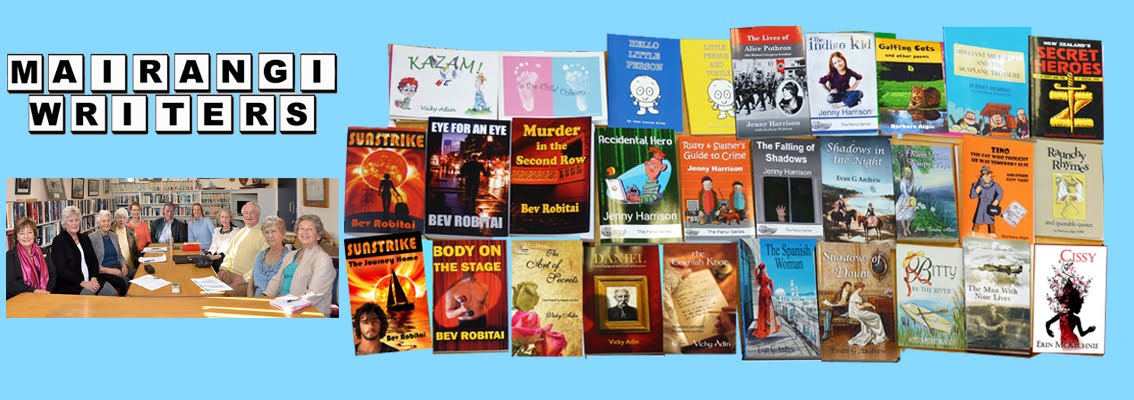WRITERS BEWARE
A recent press release covering the decline and fall of Jill Marshall, until recently CEO of PearJam Books, sends creepy things running up and down my spine.
Who can you trust these days? Even the mighty Fonterra has fallen face down in the cow-yard slush. Their resounding crash will have taken the publicity heat out of Jill Marshall and her broken dreams. But what of her innocent clients, all too often not only out of pocket, but out of patience, out of product (books) and out of mana, due to the sloppiness of the more recent editing and printing.
So what went wrong? Is this a case of Murphy’s Law or just a minnow pretending to be a shark in the publishing/ editorial world? New Zealand’s tiny population and consequently the ‘self absorption’ of publishing houses to an ever-diminishing degree has created a vacuum for writers. Consequently their course-plotting for any port that offers apparent shelter and the eventual publication of a treasured manuscript, seems the only way to go.
What is to be done? Should a writer be looking overseas at larger more sturdy publishing houses, perhaps Australia?
Is this a warning that online publication is the safer way ahead?
Modern technology is a mine-field to the older writer and the more than scary prospect that completed ms will have to be handed to the techno-savvy for good or ill.
Anyone who has an answer for current NZ writers who might right now, be putting out feelers to one of the few remaining publishing houses in this country, is invited to respond to this blog. Those of you who have experienced a disheartening and down-right dishonest state of affairs such as Jill Marshall and her PearJam Books failure, are welcome to record your plight and if possible what was done to rectify the matter.
Pam Laird

The Jill Marshall saga is very sad. So many writers with their dreams dashed and their hard-earned money gone. I was in a similar situation some years ago when an agent offered to sell my first novel. She asked for $1,000 upfront and assured me she would sell my book overseas. Needless to say, she skipped the country with my money and my book never saw the light of day. Moral of the story: it is unethical for an agent/publisher to ask for money upfront. Agents and publishers make their percentage on a book they have worked hard to promote and sell. They take their cut (15%) once the book has been sold. Don't let them fool you into handing over money they will not have earned.
ReplyDeleteA thought provoking comment thanks, Pam.
ReplyDeleteHi Pam, I'm one of the affected (and disaffected). As to recording our plight, I think Phil Taylor did a pretty good job of that in his full page article in the NZ Herald the Saturday before last. As to rectifying the matter... well, we're all getting back on our horses in various ways. I plan to self-publish my book as an ebook through Smashwords and Amazon, and a print book through Amazon's CreateSpace. That means finding the money for things (we've already paid for) like cover design. The other, rather trying job has been getting the books off various e-tailer websites so that we can offer them to other publishers or self-publish them. As long as they remain for sale with Pear Jam as publisher we are in a real snafu. We can't put them back online, and Pear Jam continues to get royalties. (The company has never paid royalties to any of its authors and has never asked for our bank account numbers).
ReplyDeleteI think the key thing to remember here is that Pear Jam contracted to provide what would easily have cost us $10,000 had it all been delivered:
Education component - 25 x 1.5 hour teleconference calls
Professional manuscript edit and proof
Cover and internal design
Marketing materials
Author website designed and hosted
225 print copies delivered to author
ebook conversion and publishing
Distribution to bricks & mortar stores
Agent representation overseas
PR
Publishing for a year under the imprint
While it's a load of money, it wasn't an outrageous figure had all that been done to a high standard. (Of course, it's an outrageous figure to lose). Jill, a best-selling author herself, had a good reputation in NZ and had a personal relationship with all ten of us. So we, all took a risk, but it was a carefully calculated one. None of us ever dreamed she would fail so spectacularly. That's not what caused irreparable damage to her reputation, though. Companies fail all the time. By blaming us for the demise, refusing to honour the contracts, and cutting off all communication she did herself a huge disservice. Anyhow, to answer the chief question in your blog, my personal opinion is that DIY is the only real avenue left to us unpublished Kiwi authors. If it goes gangbusters and a publisher picks you up, then great. Otherwise, it's a hobby. Like all hobbies, you will probably spend more money on it than you make from it, but it's worth it for the chance to express yourself and the joy of those "I loved your book" comments from readers. For me, I don't write full time because I can't afford to. But I do write when I can because I can't afford not to. When I'm writing I'm at my happiest.